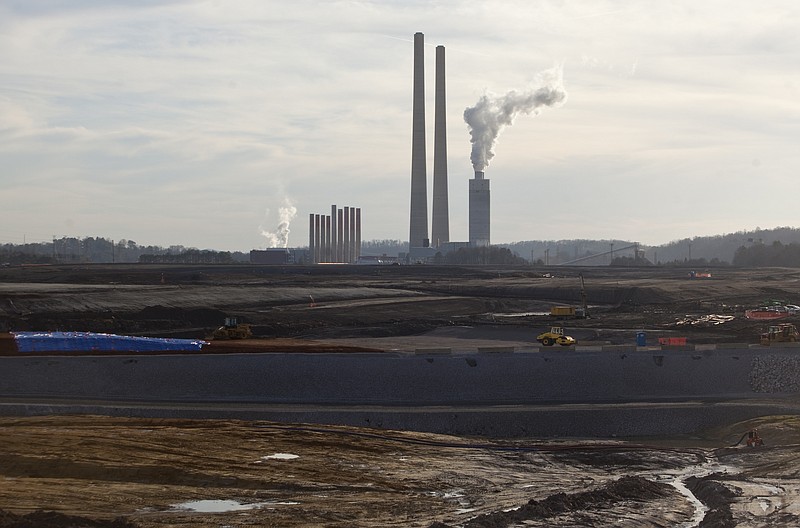The Environmental Protection Agency is strengthening a rule aimed at controlling and cleaning up toxic waste from coal-fired power plants, extending federal monitoring, closure and cleanup requirements to hundreds of older landfills, ponds and dump sites.
The proposed rules announced Wednesday would for the first time require safe management of so-called coal ash dumped in 11 unregulated ponds and inactive landfills in Tennessee that are on or near current and former TVA power plants, according to the environmental group Earthjustice.
EPA Administrator Michael Regan said the plan would hold polluters accountable for controlling and cleaning up coal ash, a byproduct of burning coal that can pollute waterways, groundwater, drinking water and the air. Coal ash contains contaminants such as mercury, chromium and arsenic associated with cancer and other health problems.
"Ensuring the health and safety of all people is EPA's top priority, and this proposed rule represents a crucial step toward safeguarding the air, groundwater, streams and drinking water that communities depend on," Regan said in a statement.
If finalized, the rule would help protect underserved and minority communities already overburdened by pollution, reflecting the Biden administration's commitment to environmental justice, Regan said.
"Many of these communities have been disproportionately impacted by pollution for far too long," he said, noting that power plants, chemical plants and other large industrial sites are commonly located in poor and minority neighborhoods.
The proposed rule follows an EPA proposal last week to impose new limits on greenhouse gas emissions from coal- and gas-fired power plants — the Biden administration's most ambitious effort to roll back planet-warming pollution from the power sector, the nation's second-largest contributor to climate change.
The agency also has proposed rules to crack down on polluted wastewater from coal-burning power plants and limit emissions of mercury and other harmful pollutants from coal-fired power plants, updating standards imposed more than a decade ago.
The coal ash rule follows a legal settlement between the agency and public interest groups, including the National Association for Advancement of Colored People, Sierra Club and Clean Water Action.
The groups said in a lawsuit that a 2015 EPA rule on coal ash failed to regulate a large portion of coal ash pollution in the United States, including TVA sites at the Allen plant in Memphis, the Watts Bar plant in Spring City, the John Sevier plant in Rogersville and the Kingston Fossil plant.
Coal ash storage and disposal goes back decades but went largely unregulated until a 2008 spill at a Tennessee Valley Authority power plant in Kingston, Tennessee. A containment dike burst and flooding covered more than 300 acres (121 hectares), dumped waste into two nearby rivers, destroyed homes and brought national attention to the issue.
The EPA rules proposed Wednesday are still subject to 60 days of public comment. TVA spokesman Scott Brooks said the federal utility is reviewing the proposed federal rule and how it will apply to TVA's cleanup program, which has already topped $1 billion in expenses for TVA to clean up the Kingston coal ash spill and other coal storage sites.
"It will not impact our steadfast commitment and efforts for safe, innovative, responsible coal ash management," Brooks said in an emailed statement Wednesday. "TVA is an industry leader in coal ash management implementing best practices years before they were required by the 2015 federal coal ash rule and continuing to pioneer new technology to ensure our coal ash sites are safe, secure, and protective of the environment and public health."
But Earthjustice claims that 91% of coal plants are currently polluting groundwater above federal health standards. The environmental group called EPA's new proposal a major win for communities near coal-fired power plants. The revised rule extends federal coal ash regulations to most coal ash disposed at power plants and extends federal monitoring, closure and cleanup requirements to hundreds of older landfills, ponds and dump sites that previously were excluded, the group said.
"This is a really big deal," said Lisa Evans, senior counsel for Earthjustice. "The Biden administration is standing up for people near hazardous coal waste sites around the country. For far too long, a large portion of toxic coal ash around the U.S. was left leaching into drinking water supplies without any requirement that it be cleaned up."
The EPA proposal tightens a loophole that allowed many power-plant owners to avoid "cleaning up the toxic mess they created," Evans said.
"Power plants will finally lose their hall pass to leave coal ash wherever they dumped it," she said. "We've learned polluters rarely do the right thing unless they know there are serious consequences. Enforcement will make or break these new safeguards."
Based on analysis of industry data provided to the EPA, Earthjustice identified 566 landfills and ponds at 242 coal plants in 40 states that were excluded from the 2015 federal regulations, Evans said.
EPA estimates it would cost utilities more than $300 million a year to comply with the new rule, which is expected to become final next year.
The power industry has complained about an "onslaught" of EPA rules aimed at the power sector. The agency's actions are "designed specifically to cause the premature closure of coal power plants," said Michelle Bloodworth, president and CEO of America's Power, a lobbying group for industries involved in producing electricity from coal.
She urged EPA to modify its proposals "to avoid premature coal retirements, rather than speed up retirements and jeopardize grid reliability."
— Compiled by Dave Flessner
